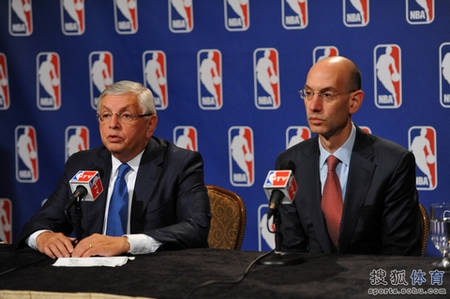Christmas will be right on time this year for NBA fans
 0 Comment(s)
0 Comment(s) Print
Print E-mail
China Daily, November 28, 2011
E-mail
China Daily, November 28, 2011
 |
|
NBA Commissioner David Stern and Deputy Commissioner Adam Silver speak to members of the press to announce a tentative labor agreement between the NBA and Players Representatives on November 26, 2011 in New York City. |
With a tentative labor agreement in place, National Basketball Association owners and union officials went back to work on Saturday, relaying details of the deal with hopes of cementing it quickly.
After a 149-day lockout that ultimately will cost the league approximately a half-billion dollars in losses, a marathon bargaining session produced a handshake agreement earlier in the day - actually, just a few hours before daybreak.
President Barack Obama gave a thumbs-up when told about the tentative settlement after he finished playing basketball at Fort McNair in Washington on Saturday morning.
Commissioner David Stern still must sell his owners on an agreement that could change the way they do business. And the players, looking beat and beaten, face a tougher healing process in approving a pact that significantly limits their earnings.
But considering everything owners sought when these negotiations opened with a contentious meeting at the All-Star break in February 2010, perhaps they will feel relieved they got as much as they did.
Players' association executives Derek Fisher and Maurice Evans hardly looked enthused about the agreement as they sat next to executive director Billy Hunter on the same side of a conference table with Stern, Deputy Commissioner Adam Silver and Spurs owner Peter Holt, the chairman of the league's labor relations committee.
But at least they weren't sitting in a courtroom, where they appeared headed less than two weeks earlier.
Just 12 days after talks broke down, Stern and Hunter appeared together after 3 a.m. on Saturday to announce the 10-year deal, with either side able to opt out after the sixth year. It leaves the NBA with its second shortened season (the first was the 50-game 1998-99 season), with the hope of getting in 66 games instead of a full 82-game schedule.
Stern said he expects the labor committee to endorse the deal and recommend it to the full board for approval.
The players' side has revealed little of its feelings about the deal, noting the pending antitrust litigation in its desire to keep details quiet. But players always preferred to be on the court, rather than in it, and now they finally have the chance - starting Christmas Day.
For the season openers, it would be Boston at New York, Miami at Dallas and Chicago at the Lakers.
Now, the regular season would end one week later and push back NBA finals a week, potentially setting up a Game 7 on June 28, 2012.
The deal also calls for no hard salary cap, no rollbacks of existing salaries and contracts can still be fully guaranteed. Owners had called for all of that, seeking a route to profitability after saying they lost $300 million last season, and believing they would create a level of parity that had been missing.
But players' annual raises were trimmed from 10.5 percent for those re-signing with their own teams and 8 percent for those leaving to 7.5 percent and 4.5 percent respectively. Rules implemented to curb spending by teams over the luxury tax will limit some of their options in free agency.
Owners relented slightly on their previous insistence that players receive no more than 50 percent of basketball-related income after they were guaranteed 57 percent in the old CBA. The target is still a 50-50 split, but with a band from 49 percent to 51 percent that gives the players a better chance of reaching the highest limit than previously proposed.
Players filed an amended antitrust lawsuit in Minnesota on Monday that could have earned the players billions but surely would have come at the cost of at least the entire 2011-12 season.
The sides said all along the only way to a deal was through negotiating. They got back together on Tuesday, setting the way for the pivotal meeting that began on Friday.
Now, players must drop the lawsuit against the league and reform their disbanded union before they can vote on the deal.
Once the pact is approved, it would pave the way for training camps and free agency to open simultaneously Dec. 9, setting off a chaotic flurry of activity that could leave coaches running practices with different players arriving each day. There could be an even larger pool of free agents if teams use the amnesty clause, which allows them to waive one player during the deal and have 100 percent of his salary taken off the cap and the tax.
Because the union disbanded, a new collective bargaining agreement can only be completed once the union has reformed. Drug testing and other issues still must be negotiated between the players and the league, which also must dismiss its lawsuit regarding the legality of the lockout.






Go to Forum >>0 Comment(s)